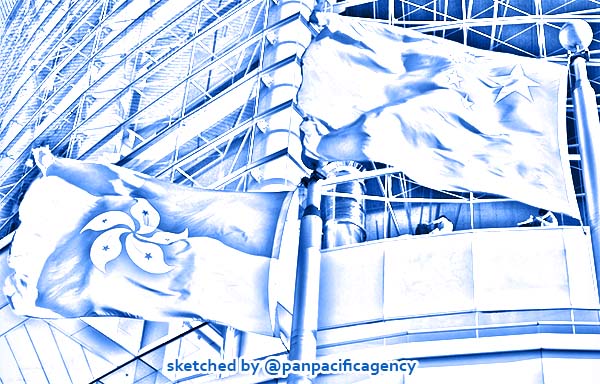UK confirms it will suspend Hong Kong extradition treaty over national security law

Pro-democracy legislators had successfully stalled the new law for months, but it was passed on Thursday afternoon. File image: Shutterstock. Sketched by the Pan Pacific Agency.
LONDON, Jul 20, 2020, SCMP. Britain has suspended its extradition treaty with Hong Kong following China’s imposition of a national security law in the city. The decision comes despite Beijing’s threats to retaliate, while Hong Kong officials decried it as turning UK into a safe haven for criminals, South China Morning Post reported.
“The government has decided to suspend the extradition treaty immediately and indefinitely,” Foreign Secretary Dominic Raab told Parliament on Monday.
“We will not consider reactivating those arrangement unless and until there are clear and robust safeguards which are able to prevent extradition from the UK being misused under the national security legislation”.
Raab was responding to mounting pressure to suspend the treaty over fears that the Hong Kong government would use it against those fleeing the new law, which has a sweeping definition of national security offences and covers the whole world.
But he stopped short of tearing up the treaty altogether, in what British sources keeps a “final lever to pull” should China continue to breach its international commitments.
Chinese foreign ministry spokesman Wang Wenbin said recent remarks by Britain on Hong Kong violated international laws and international relations norms.
“It is a serious violation of China’s domestic affairs. We express strong condemnation and opposition,” he said. “We call on the UK [United Kingdom] not to go further down the wrong path to avoid further damage to Sino-UK relations. China will take resolute countermeasures for moves that interfere in its domestic affairs.”
Wang also rejected remarks by British Foreign Secretary Dominic Raab on human rights in Xinjiang Uygur autonomous region, saying it was a smear against China.
Canada and Australia have suspended their treaties with Hong Kong, citing a fear of political persecution. The US was preparing a similar move last week, while New Zealand was reassessing the legal instrument as part of a “deliberate, considered review” of its relations with Hong Kong.
Hong Kong national security law official English version
Raab’s decision was made amid strong pressure from British members of parliament calling for a tougher stance on Beijing. It coincided with the start of United States Secretary of State Mike Pompeo’s visit to London to hammer out an Anglo-American strategy on China.
In a series of moves after China’s imposition of the new national security law which came into force on June 30, Britain has announced a new scheme for about 3 million Hongkongers eligible for British National (Overseas) passports to move to Britain with a new path to citizenship, and banned Huawei Technologies from Britain’s 5G networks.
British Conservative Party rebels, some of whom will speak to Pompeo ahead of his meeting with Raab and Prime Minister Boris Johnson, are moving to the next battleground: to kick Chinese social-media app TikTok and its mother company ByteDance out of the country.
Britain is also grilling China on the issue of Uygur Muslims in Xinjiang, at least a million of whom had been kept in re-education camps, according to United Nations estimates.
Shaun Bailey, the Conservative candidate for the London mayoralty, has called for the capital to end its twinned status with Beijing, saying: “What kind of signal are we sending when we continue a relationship with a government that is seeking to curtail human rights with new security laws in Hong Kong, while overseeing the cruel persecution of its Uygur Muslims?”
Lisa Nandy, Labour’s shadow foreign secretary, asked the government to sanction Chinese officials involved in human rights abuses against the Uygurs. Raab did not make the move on Monday, but on Sunday he described China’s policy in the far-western region as “gross, egregious”.